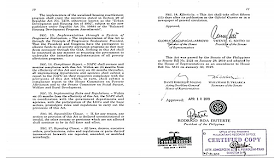Under the law, “the government shall establish a system of progressive realization or implementation to provide the requirements, conditions, and opportunities for the full enjoyment or realization of the following rights of the poor, which are essential requirements towards poverty alleviation.”
Ads
As a vow to the Filipino people to fight poverty and lessen the number of those living below the poverty threshold set by the National Economic Development Authority or NEDA, Republic Act 11291 or ‘Magna Carta for the Poor’ was signed by President Rodrigo Duterte.
Under the law, concerned government agencies should ensure that Filipinos’ rights are protected and that they are getting the adequate government services they need.
The law mandates the Department of Social Welfare and Development (DSWD) and Department of Agriculture must work hand in hand to minimize or mitigate hunger.
The Labor Department must ensure that there will be equal opportunities for jobseekers. National and public works projects must fill the 30% of their manpower from the poor sector.
The Health Department is mandated to provide quality and universal healthcare services.
The government should continue socialized housing programs and relocating those who are living in danger zones.
Access to free tertiary education and expand programs for technical and vocational courses.
The beneficiaries will be determined by NEDA and DSWD and the National Anti-Poverty Commission (NAPC).
Ads
Sponsored Links
It also states that there will be a non-diminution of the rights of the poor or that “all other rights of the poor provided under existing laws shall remain in full force and effect.”
Within six months from the effectivity of this act, the National Anti-Poverty Commission (NAPC) shall, in coordination with the government departments and agencies, with the participation of the local government units and the basic sectors, promulgate rules and regulations to carry out the provisions of this Act.
This Act was passed by the Senate of the Philippines as Senate Bill 2121 on January 29, 2019 and adopted by the House of Representatives as an amendment to House Bill 5811 on January 30, 2019.
The full implementation of the law shall take effect 15 days after its publication in the Official Gazette or in a newspaper of general circulation.
On April 17, Duterte also signed into law an act institutionalizing the Pantawid Pamilyang Pilipino Program (4Ps).
Under the law, “the government shall establish a system of progressive realization or implementation to provide the requirements, conditions, and opportunities for the full enjoyment or realization of the following rights of the poor, which are essential requirements towards poverty alleviation.”
The said magna carta was proposed six years ago during the term of the former administration but later vetoed due to insufficient fundings.
©2019 THOUGHTSKOTO

